Programas de transferencias monetarias sectoriales
Los PTM pueden ayudar a las personas en situaciones de crisis a abordar sus necesidades dentro de un determinado sector humanitario, tales como: agua, alimentos, salud, vivienda, medios de vida, o protección. Los PTM sectoriales pueden ser restringidos o sin restricción, condicionales o incondicionales, y normalmente serán proporcionados como parte de un paquete integral que puede incluir asistencia en especie o servicios.
Cada sector tiene que considerar distintas preguntas, retos, ventajas y riesgos cuando se trata de apoyar la recuperación de las personas dentro de su área de especialización. Esto requiere evidencias, herramientas, orientación y capacidad. Para cumplir los resultados sectoriales a través de los PTM también se requiere de una comprensión multisectorial de las necesidades y de la seguridad económica de los hogares (vea las Transferencias monetarias multipropósito). Mientras que algunos sectores tienen mucha experiencia en la implementación de los PTM y lo han hecho por muchos años, otros se están poniendo al día. La mayoría de los sectores humanitarios están comprometidos y han venido aumentando sus esfuerzos en los PTM sectoriales. El Grupo global de coordinación de clusters (GCCG, por sus siglas en inglés) también se encuentra coordinando el trabajo entre clusters para mejorar la utilización sectorial de los PTM.
Prioridades actuales
La CALP Network trabaja en estrecha colaboración con los grupos técnicos de asistencia en efectivo y equipos de tareas dentro de los clusters globales, que han estado definiendo sus prioridades y planes de trabajo del 2020 durante sus reuniones regulares. Una descripción general y detalles específicos de estas prioridades en cada cluster global está disponible aquí.
Subpáginas de los PTM sectoriales
-
Coordinación y gestión de campamentos y programas de transferencias monetarias
-
Educación y programas de transferencias monetarias
-
Seguridad alimentaria y programas de transferencias monetarias
-
Salud y programas de transferencias monetarias
-
Nutrición y programas de transferencias monetarias
-
Protección y programas de transferencias monetarias
-
Alojamiento y programas de transferencias monetarias
-
Agua, saneamiento e higiene (WASH) y programas de transferencias monetarias
Contenido destacado
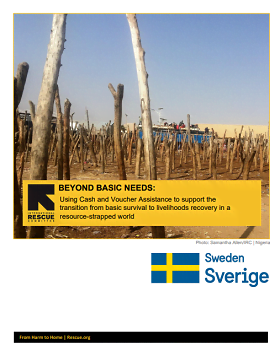
Beyond Basic Needs: Using Cash and Voucher Assistance to Support the Transition from Basic Survival to Livelihoods Recovery in a Resource-Strapped World
Guidelines and Tools
Do you think of yourself as a “cash” person OR as a “livelihoods” person? An “emergency” practitioner OR a “recovery” practitioner? Or do you find yourself unsatisfied with the often narrow implications of these terms? We’ll never have enough funding to provide basic needs support to everyone who needs it for the entire time they are in need, even if we take advantage of the...

Looking into 2020: short overview on global clusters, CVA and the CALP Network
Presentation
Overview as 2020 begins:
• Significant progress and commitment from all global clusters on integration of CVA into their work.
• Significant interest in different regions and by some donors on sector-specific CVA.
• Challenges that remain:
o Dialogue: 1) Ensuring CVA specialists understand sector specificities and successfully bank on the technical expertise emanating...

Building Evidence to inform the Effective Use of CASH and Voucher Assistance in Emergency Sanitation and Hygiene Programming
Report
An analysis of 5 case studies of utilization of CASH/Voucher Assistance are presented and analysed in the attempt of building evidence on their utilization in emergency WASH Sanitation and HP programming. Findings and recommendations are provided on Coordination, Situation and Response Analysis, Program Design, Implementation, Monitoring and Evaluation.
Últimos recursos
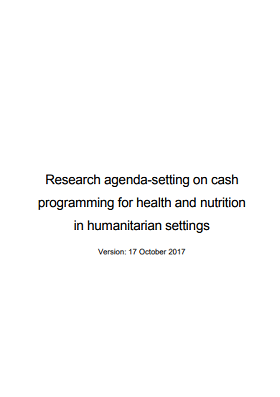
Research agenda-setting on cash programming for health and nutrition in humanitarian settings
Report
While the evidence base for cash transfer programming (CTP) in humanitarian contexts is more established for food security, it is very limited for health. The aim of this study was to develop a research agenda on CTP for health and nutrition in humanitarian settings.

Cash and Education in Somalia, Somalia Education Cluster (October 2017) – CTP in the education response
Report
Two-page briefing on cash and education in Somalia

Cash for Education: A global review of UNHCR programmes in refugee settings
Report
This review provides an overview of the use of cash assistance in 45 cash-related education programmes in 21 UNHCR operations. It highlights the key opportunities and challenges with the use of cash for education and provides key direction for future programming and related protection considerations....

Challenging the System: Humanitarian Cash Transfers in Iraq
Report
Cash transfers have been used in Iraq to meet the critical basic needs of a highly vulnerable population, providing them dignity and flexibility in a context of uncertainty and economic need. Although Iraq is an appropriate context for the use of cash transfers, factors including government acceptance,...

Can Conditional Cash Transfers improve the uptake of nutrition interventions and household food security? Evidence from Odisha’s Mamata scheme
Report
There is considerable global evidence on the effectiveness of cash transfers in improving health and nutrition outcomes; however, the evidence from South Asia, particularly India, is limited. In the context of India where more than a third of children are undernourished, and where there is considerable...

Humanitarian Cash Transfers in the Democratic Republic of Congo
Report
The Democratic Republic of Congo (DRC) is at a crossroads with regard to cash transfers. On the one hand, cash has been accepted by most donors and aid agencies as an appropriate response, with solid evidence underpinning its use. Aid agencies have driven important innovations in an environment where...
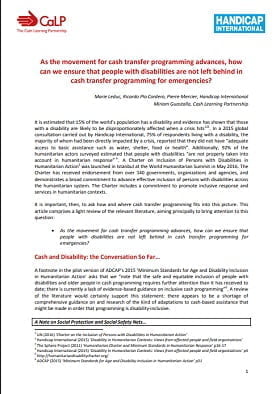
As the movement for cash transfer programming advances, how can we ensure that people with disabilities are not left behind in cash transfer programming for emergencies?
Report
It is estimated that 15% of the world’s population has a disability and evidence has shown that those with a disability are likely to be disproportionately affected when a crisis hits. In a 2015 global consultation carried out by Handicap International, 75% of respondents living with a disability, the...
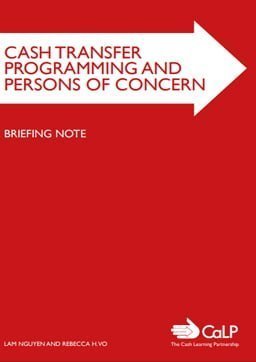
Cash Transfers Programming and Persons of Concern
Report
A significant majority of Persons of Concern (POC) in Asia are living in non-camp, urban settings. The longer-term implications of this for assistance programmes have often been overlooked or even dismissed as being too complex or politically sensitive to consider interfering. Nevertheless, the...

Finding Economic Opportunity in the City: Lessons from IRC’s Cash and Livelihoods Programmes in Cities within Lebanon and Jordan
Report
This report looks at IRC’s experiences in cash assistance and livelihoods programming in Lebanon and Jordan in the context of the Syrian regional response. It explores opportunities and challenges inherent to cash and livelihoods programming, identifying good practices and ways to integrate other...
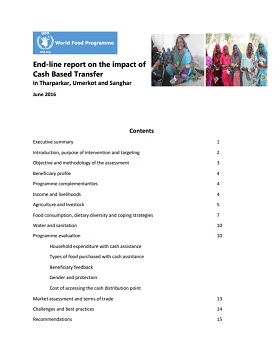
End-line report on the impact of Cash Based Transfer in Tharparkar, Umerkot and Sanghar
Report
The Food for Assets through Cashed Based Transfers was implemented in three drought affected districts of Sindh namely Tharparkar, Umerkot and Sanghar during the period from July 2015 to January 2016 covering 17,000 beneficiaries. The programme engaged beneficiary households in Cash for Training...
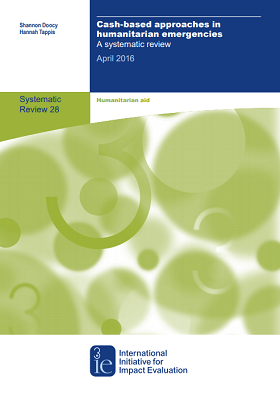
Cash-based approaches in humanitarian emergencies A systematic review. April 2016
Report
Humanitarian actors have a responsibility to ensure that assistance is provided in a way that minimizes risks and maximizes benefits to people affected by crisis. However, there are many challenges in evaluating ‘what works’ in addressing the needs of crisis-affected populations, and translating...

DFID Shock-Responsive Social Protection Systems research: Literature review
Report
DFID has commissioned research into Shock-Responsive Social Protection systems, to further understand the nature of the interaction between social protection, humanitarian and disaster risk management systems and ways in which long-term social protection systems can be scaled up to
provide support in...
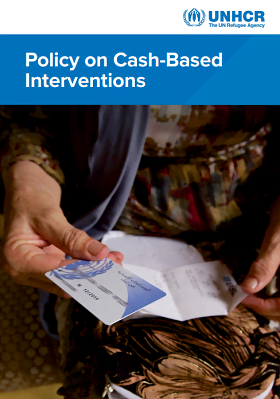
Policy on Cash-Based Interventions
Report
UNHCR’s Policy on Cash-Based Interventions (CBIs) is introduced herewith to expand and systematise the use of CBIs as a modality of assistance and service delivery across the organization and its operations worldwide. The Policy reconfirms UNHCR’s commitment to the increased use of CBIs and sets out...

Literature review on the Use of Cash in Shelter
Report
The Global Shelter Cluster (GSC) with support from UNHCR conducted this literature review of the use of cash in shelter programming to help assess how much documented evidence was currently available from within the sector. The objective of this study is to help better prepare the GSC and its members to...
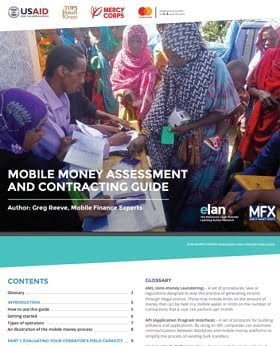
Mobile money assessment and contracting guide
Guidelines and Tools
Mobile money offers tremendous potential to enable cash transfers at scale and connect program participants to financial services. Oftentimes, however, humanitarian practitioners struggle to understand mobile money terminology to confidently evaluate different mobile money operators and to design...

Using Cash for Shelter: An Overview of CRS Programs
Report
Cash continues to gain prevalence as a modality for humanitarian agencies to help people meet multiple and diverse needs in the wake of a crisis. It provides people with the dignity of choice, and is often significantly more cost-efficient than the delivery of in-kind aid. In programs with a shelter...
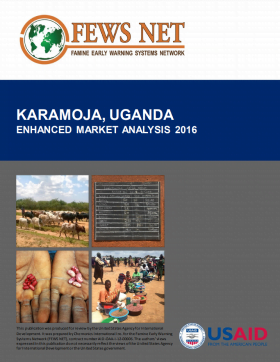
Karamoja, Uganda: Enhanced Market Analysis
Report
The Market Fundamentals reports serves as starting points for providing efficient and effective market-based response decision support for both emergency and development programs in Karamoja Region of Uganda. It examines the appropriateness and feasibility of modality response options for the region.
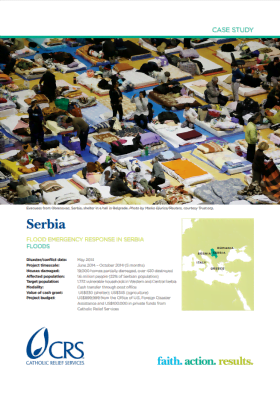
Using Cash for Shelter: Flood Emergency Response in Serbia
Case Study
The devastating floods that affected the Balkans in May 2014 affected 1.6 million people, 22 percent of Serbia’s population, and have set the country’s economic development back decades. Catholic Relief Services (CRS) conducted rapid assessments in 13 villages in the municipalities of Šabac, Valjevo,...

The Politics of Cash: A Case Study on Humanitarian Cash Transfers in Ukraine
Report
This case study examines the evolution of cash transfers in the humanitarian response in Ukraine. The use of cash transfers in Ukraine brought out the best and worst aspects of the international humanitarian system. Uncertainty over where cash fits into the humanitarian architecture – and whether...

Rapid Assessment for Markets: Bidibidi Refugee Settlement
Report
The Rapid Assessment of Markets (RAM) conducted within the Bidibidi Refugee Settlement and in the surrounding Ugandan towns and trading centres sheds some light upon the rapidly developing network of marketplaces within one of the world’s fastest growing refugee settlements. The RAM highligthed key...


